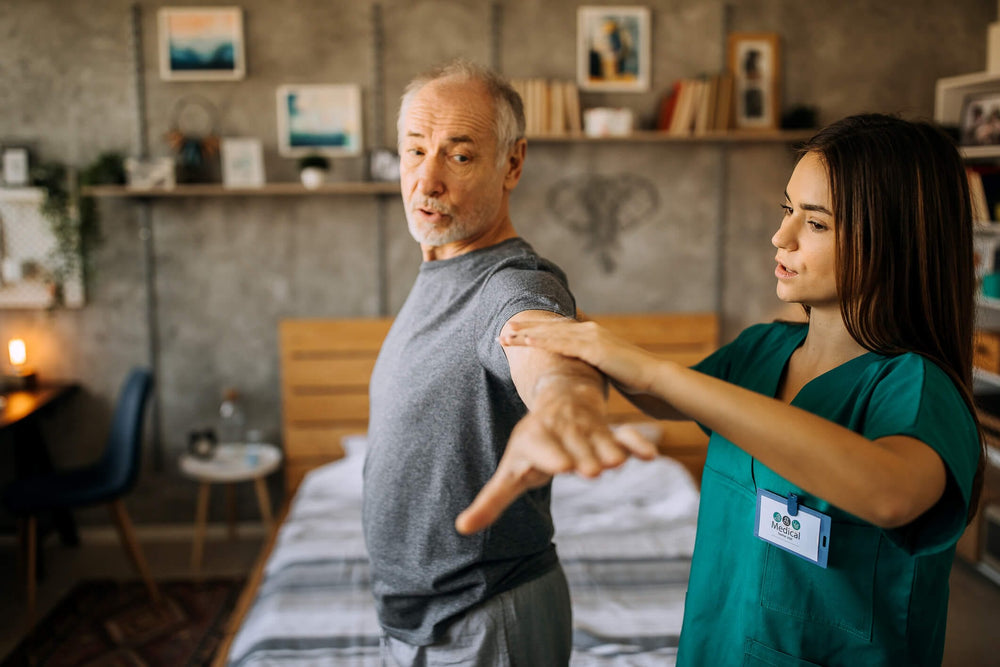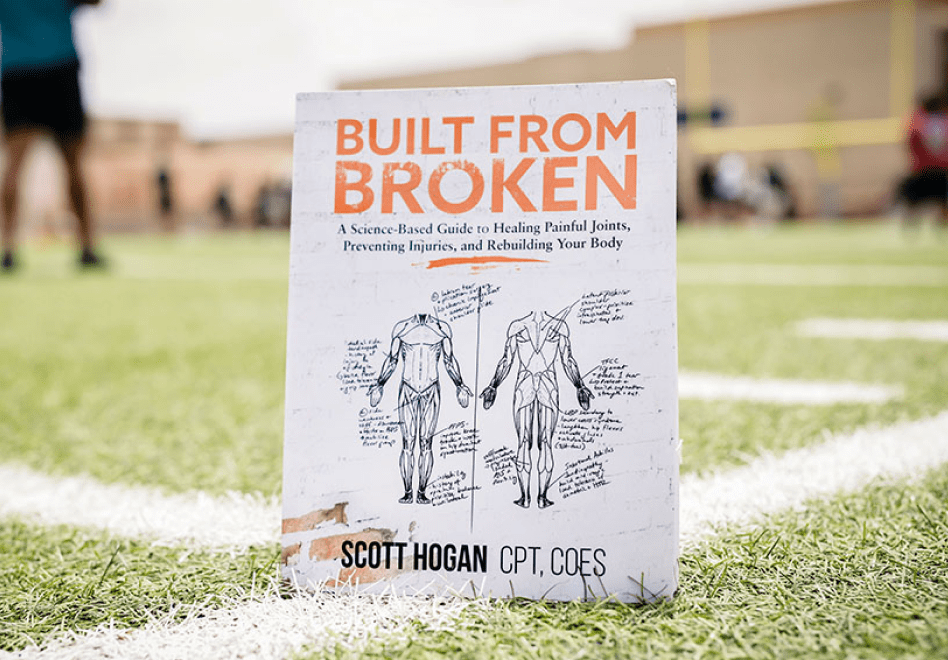
Be built (to last).
The right supplements can help you recover naturally and build a resilient body.

Supplement Quiz
Take this short quiz to discover the perfect supplements for your needs and goals.
About SaltWrap

Built from Broken
Get the best-selling book from SaltWrap founder, Scott Hogan, and start rebuilding today.
What Causes Leg Cramps at Night (and How to Prevent Them)
by Scott Hogan, ACE-CPT, COES
Leg cramps at night can be a literal pain in the a** (though they more commonly affect the muscles of the lower legs and feet). Unlike typical muscle cramps, they're usually NOT caused by dehydration, electrolyte imbalance, or even overuse. In most cases, there are several variables causing this sleep-interrupting nuisance.
In this article, we dive into what leg cramps at night mean, what causes them, and how you can prevent them according to studies in neurology, physiology, and our own clinical experience.
Key Points
- Leg cramps at night (also called Nocturnal Leg Cramps) are caused by a multitude of factors including magnesium deficiency, disrupted Circadian Rhythm, damaged or overactive nerves, activity levels and stress.
- Studies show magnesium supplementation alone is not effective for resolving nocturnal leg cramps.
- To prevent and resolve nocturnal leg cramps you need to address underlying nutritional deficiencies, nerve health, and muscle dysfunction.

Fig. 1: Lower Leg Anatomy: Nocturnal leg cramps typically affect muscles in the lower legs and feet, but can affect the upper thigh muscles as well. Leg cramps may also be accompanied by muscle cramps in the back, arms, and hands.
Doctors, neurologists, and physiologists have long been stumped by nighttime leg cramps.
Referred to as "Nocturnal Leg Cramps" this condition is exceedingly common in aging adults and athletes.
Studies show around 1/3 of adults aged 60 or more experience nocturnal leg cramps, and nearly one-half of those aged 80 years or more. Of those affected nearly 40% experience nighttime episodes several days per week.
Nocturnal leg cramps are characterized by episodes of painful, sudden, intense, involuntary contractions of muscles in the legs, feet and other extremities in the middle of the night.
Unlike typical muscle cramps, nocturnal leg cramps typically do not resolve naturally over time.
Typical Muscle Cramps vs. Leg Cramps at Night
Typical Muscle Cramps
- Painful, intermittent episodes of muscle contractions
- Often caused by physical exercise or unaccustomed vigorous exercise
- Condition self-resolves over time
- Symptoms onset during period of inactivity or extreme hyperactivity
Leg Cramps at Night
- Painful, episodes of muscle contractions lasting up to a few minutes during the nighttime
- Disturbs sleep patterns (Circadian Rhythm)
- Results in lasting discomfort which may persist for several hours
- Usually affect the thighs, calves and muscles of the feet
- Condition does not self-resolve over time
- Caused by nervous system malfunction & key nutrient deficiencies
- Magnesium supplementation alone does not resolve symptoms
According to the esteemed, British Medical Journal (BMJ), a viable pharmacological option for nocturnal cramps “remains elusive.” Quinine is only moderately effective against nocturnal leg cramps, and there are significant concerns about its safety — leading most doctors to believe the risks outweigh the potential benefits.
Exercise therapy methods have yet to be examined in controlled studies.
And for nighttime cramps, magnesium therapy alone has proven to be ineffective.
This leaves those affected with no long-term, safe treatment options.
That is, until now.
Recent studies crossing-over the categories of neurology, physiology, and sleep health show promise for finally conquering nocturnal leg cramps.
In this article, we cover:
- why nocturnal leg cramps are caused by a completely different condition than typical muscle cramps
- why magnesium supplements alone do not solve nocturnal leg cramps
- what leading neuro-physiological studies show could be the cause and solution
Why Magnesium Supplementation Alone Doesn't Solve Nocturnal Leg Cramps
Recent estimates show that up to 80% of adults are deficient in magnesium.
This is due to several factors, including:
- De-mineralization of ground soil from mass agricultural
- Reduced nutrient density in modern diets (greater reliance on pre-packaged foods)
- Increased magnesium excretion (reduced absorption) caused by stress, caffeine and sugar intake, and certain pharmaceuticals
The alarming aspect of this statistic isn't the high percentage — it's that these figures are based on the minimal amount necessary to prevent disease!
That's right — the RDI (Referenced Daily Intake) figures you see on the backs of nutrition labels are only meant to ward off disease. They aren't designed to facilitate optimal health, let alone improve it.
This means that virtually everyone would benefit from increasing magnesium intake.
Since whole food is clearly not sufficient, it makes sense to use a magnesium supplement.
But not all are created equal.
And for those suffering from nocturnal cramps, a specific type of magnesium should be used, and it should be administered immediately before bed time.
We'll come back to that in a minute.
Here are the common signs of a magnesium deficiency:
- Muscle pain and cramps
- Muscle weakness
- Fatigue
- Restlessness and sleep loss
- Mood fluctuations and anxiety
- Confusion and memory problems
If you suffer from nocturnal leg cramps, you almost certainly have a magnesium deficiency.
But that isn't the only cause.
People who suffer from nocturnal leg cramps have other key nutrient deficiencies and neuro-muscular dysfunctions.
That's why magnesium supplementation alone does not solve nocturnal cramping in clinical studies.
Nocturnal leg cramps are associated with five specific conditions that must be addressed.
People who suffer from nocturnal leg cramps have other key nutrient deficiencies and neuromuscular dysfunctions. This is why magnesium supplementation alone often does not resolve nocturnal leg cramps.
The Root Causes of Nocturnal Leg Cramps
There are five primary causes of nocturnal leg cramps.
These conditions are linked together, creating a positive feedback loop. This makes solving nocturnal leg cramps extremely difficult.
Here are the five most common, non-disease causes of nocturnal leg cramps:
1. Magnesium Deficiency
As we discussed, virtually anyone who suffers from persistent cramps has a magnesium deficiency.
So magnesium supplementation should be implemented.
Magnesium supplements demonstrated positive effects on cramps in studies (and in our experience working with exercise therapy clients).
But for nocturnal leg cramps, magnesium therapy alone has proven to be ineffective (reference: Family Practice, February 2014).
That's because people who suffer from nocturnal leg cramps have other key nutrient deficiencies and neuromuscular dysfunctions.
While magnesium is an important piece of the puzzle, it won't solve the problem by itself.
For nocturnal leg cramps, Magnesium Glycinate should be used immediately before bed.
Magnesium Glycinate is a combination of two separate compounds: the mineral Magnesium, and the amino acid Glycine.
Glycine has a natural calming effect, making it an ideal supplement to take before bedtime.
Unlike cheaper forms such as Magnesium Oxide, Magnesium Glycinate is readily absorbed into the intestinal walls. This prevents the "laxative effect" that many people experience when taking cheap magnesium supplements.
Muscle cramps can be brought by deficiencies of other minerals as well, including low potassium (hypokalemia) and low calcium (hypocalcemia). Though magnesium deficiency (hypomagnesemia) is the most common culprit both in studies and in our clinical observation.
2. Exercise & Movement Habits
The reason that leg cramps are often worst during the night is due to inactivity.
When you are still for long periods of time, neural activity and blood flow to extremities decreases. This can cause involuntary contractions of motor units (groups of nerves). When these motor units continue to fire persistently, it results in painful cramps and spasms.
Another reason that cramps persist is a malfunction of the inhibitory circuits responsible for relaxing muscles.
Because there are multiple points of possible malfunction along the muscle contraction-relaxation pathway, it's difficult to determine exactly where the fault occurs.
But in either case, the problem is caused by an underlying nerve malfunction, and exacerbated (brought to the point of symptoms) by periods of inactivity.
As you might have guessed, movement can help relieve and prevent cramps.
But how do you incorporate movement to prevent nighttime leg cramps?
Try doing reverse lunges immediately before crawling into bed to activate and stretch the primary muscles affected by nocturnal leg cramps.
You'll notice in the video below that this exercise stretches the calves on the descent, and mobilizes the quadriceps and hamstrings on each repetition.
Perform 10-15 repetitions per leg, or until you feel a good burn.
Stop before you get too exhausted to avoid ramping up your central nervous system (which could hinder sleep). The goal is to activate the muscle groups, not burn them out.
Both lack of exercise and overexertion can cause leg cramps at night.
Here are some other activity-related items that can cause (or at lease make worse) nocturnal leg cramps.
- Sitting for long periods of time during the day
- Over-exertion of the muscles (usually too high training volume in a relatively inexperienced athlete)
- Poor posture
- Tightness in low back, hamstrings, calves
- Poor circulation in legs
🔬 Nocturnal Leg Cramps VS. Restless Legs Syndrome
Nocturnal Leg Cramps and Restless Legs Syndrome (RLS) are two of the most common causes of leg pain and discomfort. Because both occur at night, and some symptoms overlap, it can be difficult to distinguish between the two.
Restless Legs Syndrome is characterized by the urge to move the lower legs at night. So the key differentiator is cramping and pain.
Are you experiencing painful cramps?
If so, you're likely dealing with Nocturnal Leg Cramps.
Are you experiencing an urge to move, or an "electric" feeling in your legs, with minimal pain?
If so, you're likely experiencing RLS.
3. Overactive or Damaged Nerves
Another common cause of nocturnal leg cramps is overactive or damaged nerves.
Neuropathy is any disorder that prevents nerves from functioning properly.
There are two main types of neuropathy:
[1] Peripheral Neuropathy — characterized by multiple affected nerves, and/or problems with the connection between the Central Nervous System (brain and spinal cord) and Peripheral Nervous System (connections running from brain and spinal chord to the rest of the body).
[2] Mononeuropathy — damage to a single nerve or nerve group (motor unit), typically caused by trauma, injury, poor circulation, or inflammation.
Nocturnal leg cramps are more commonly related to mononeuropathy than peripheral neuropathy.
And the best way to resolve symptoms caused by mononeuropathy is to address the underlying causes. That means it helps to heal any lingering injuries to muscles or joints, take steps to improve circulation, and try to reduce levels of inflammation in the body.
Our friend magnesium can help here too. Studies show magnesium supplementation can help reduce nerve pain and overactive nerves by making muscles relax.

Nocturnal leg cramps commonly originate from malfunctions in nerve cells or the neuromuscular junction—where the nerve cell intersects with muscle tissue.
When to seek medical attention
Though they may seem like a minor nuisance, leg cramps can be seriously debilitating. Schedule an appointment to see your doctor if your nighttime leg cramps:
- lead to shooting pain, tingling or numbness
- cause severe pain
- were brought on by an injury or exposure to toxin
- lead to muscle atrophy or muscle weakness (dark colored urine may be a sign of a serious muscular breakdown condition)
4. Disrupted Sleep Architecture (Circadian Rhythm)
Although we've made it clear magnesium supplementation is a must if you suffer with nocturnal leg cramps, studies show it doesn't solve night cramps on its own.
In order to solve nocturnal leg cramps, you have to re-establish a healthy sleep architecture
(i.e. your sleep habits and Circadian Rhythm).
Sometimes your body just needs a chance to sleep through the night so it can recover.
Focusing on sleep health — not just the cramps — is key.
And the longer you've been experiencing cramps at night, the more important this is.
Here are a few supplements proven to help improve your sleep architecture:
1. Vitamin B6 (Pyrodoxine) is involved in over 100 biological processes in the body. Commonly known for its role in food metabolism and Serotonin production, B6 can be found in meats, fish, eggs, nuts and seeds — and is a common added ingredient to fortified cereals and grains.
Studies have shown that poor sleepers have lower intake levels of Vitamin B6.
Because B6 is a water soluble vitamin and is metabolized quickly, it should be taken immediately prior to bed.
2. GABA & 5-HTP are two amino acids that support relaxation and healthy sleep habits. Though these two amino acids are popular and proven supplements alone, an animal study published in Behavioral Brain Research (2016) demonstrated they have a synergistic effect on sleep quality and sleep cycle architecture when combined.
Researchers from the study concluded:
"Our available evidence suggests that the GABA/5-HTP mixture modulates both GABAergic and serotonergic signaling. Moreover, the sleep architecture can be controlled by the regulation of GABA receptor and GABA content with 5-HTP.”
3. Melatonin is a naturally occurring compound secreted by the pineal gland in the human body, commonly used in supplement form to reduce symptoms of “Jet Lag” and fall asleep faster.
In clinical studies, melatonin supplements have clearly demonstrated positive effects on sleep quality (and interestingly enough, was also correlated with reduced body weight).
For people with nocturnal leg cramps, melatonin supplementation can help re-establish their disrupted Circadian Rhythm.
5. Stress
Stress puts your body into a heightened state called hyperstimluation.
Also known as the Acute Stress Response — this reaction to stressors is useful in the short-term, but damaging when it becomes chronic.
When stress responses occur too frequently, your body can get stuck in a state of emergency readiness.
This is called Stress-Response Hyperstimulation (SRH).
Several clients I've worked with have described having "cramp attacks," where they experience cramps, spasms, and pain in rapid and extended sequences. The cramps and spasms quite literally cause more cramps and spasms.
This is a snapshot of what Stress-Response Hyperstimulation can do.
To compound the situation, the stress hormones released in this state are potent stimulants (one of those being adrenaline).
Stimulants cause muscles to remain tense. Which leads to further muscle tension, muscle spasms, muscle cramps, headaches, and even increased magnesium excretion.
That's right. Stress actually increases the rate at which your body eliminates magnesium, worsening the original deficiency.
So you have a situation in which your body responds dramatically to pain or nerve malfunctions and gets stuck in the state of hyperstimulation.
You can probably imagine the vicious cycle this stress-response system creates.
Stress is an underestimated factor in why nocturnal leg cramps are so persistent once they start.
Other Conditions Related to Leg Cramps at Night
There are a few other factors associated with nocturnal leg cramps. Though most of these describe muscle cramps in general, it's important to understand these and determine if any of these factors could be the partial cause of your symptoms:
-
Dehydration and/or electrolyte imbalance
-
Physiological Disorders: Pregnancy, flat feed, poor circulation, obesity
-
Endocrine Disorders: Thyroid, Addison's Disease, HPA Axis Dysregulation
-
Neuromuscular Disorders: Peripheral Neuropathy
-
Venous Insufficiency (veins are unable to effectively send blood from legs to heart): other symptoms include leg weakness, leg pain, and general feelings of lethargy in legs.
-
Anemia: Severe anemia can cause leg cramps during exercise.
-
Alcohol, Drugs & Pharmaceuticals: Alcohol and certain pharmaceuticals have been linked to increase muscle cramping.
How to Stop Leg Cramps at Night
In order to win the battle against nighttime cramps, you need to accomplish three objectives:
-
Correct key nutrient deficiencies (namely, magnesium).
-
Re-establish a healthy sleep architecture (Circadian Rhythm) to prevent frequent waking throughout the night.
-
Relax both muscles and the nervous system immediately prior to bed.
In our research, we identified 8 natural compounds that help relax tense muscles, reverse nutrient deficiencies, and improve sleep quality.
Since there is no viable pharmacological or exercise therapy treatment for leg cramps at night — and other magnesium or cramp supplements don't work for this condition — we assembled the world's first natural muscle relaxer specifically designed to reduce night leg cramps, spasms, and tension.
It's called Mag R&R.
Mag R&R is manufactured in a GMP (Good Manufacturing Practices) approved, FDA-inspected facility right here in the USA. It's designed to be taken once per day, immediately before bed.
To test the formula's effectiveness before releasing to the public, we worked closely with our clients suffering from nocturnal leg cramps and took notes on their progress.
We were excited to launch Mag R&R and finally offer a solution to this annoying condition.
But we never could have predicted the overwhelming response from our clients — and people we’d never met who found our product online.
To read reviews from clients who have used Mag R&R, and learn more about this natural muscle relaxation formula, click the learn more button below.
Conclusion
Leg cramps at night are a nuisance. But they can also be a seriously debilitating problem, interrupting sleep and reducing overall quality of life.
And the longer you have them, the tougher it is to get rid of them.
The most common non-disease causes are magnesium deficiency, exercise & movement habits, nerve malfunction, stress, and disrupted sleep patterns.
Although magnesium supplementation can provide relief for most cases of muscle cramps, leg cramps at night require a more holistic approach. This includes reducing lifestyle stress, supplementing with key nutrients, getting enough exercise, and establishing healthy sleep habits.
After reading this article, what steps will you take to prevent and resolve nocturnal leg cramps?
Founder: Scott Hogan

I created SaltWrap to bring together the most practical ideas in therapeutic sports nutrition, corrective exercise, and functional fitness — with the goal of keeping you (and myself) strong, mobile, and built to last.
I've worked as an A.C.E. Certified Personal Trainer, Orthopedic Exercise Specialist, and nutritional supplement formulator.
But more importantly — I've spent most of my life battling injuries, joint pain, and just being plain beat up. So I know what it's like to struggle toward fitness goals.
SaltWrap is here to push you through injuries, setbacks and perceived physical limitations. To a place beyond what you think you're capable of. Sign up here to stay in the loop.
Learn more about my best-selling injury prevention and recovery book, Built from Broken.








